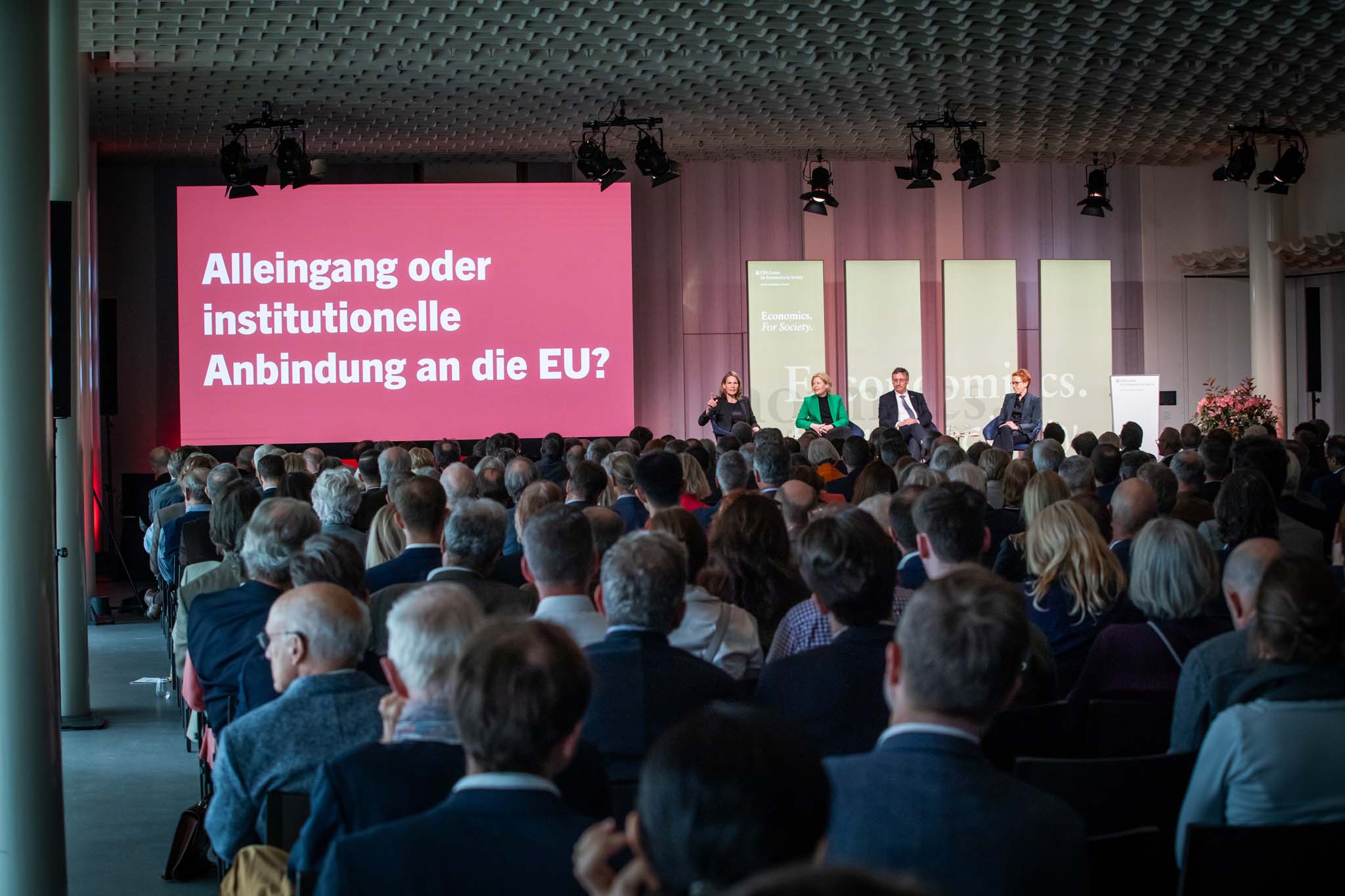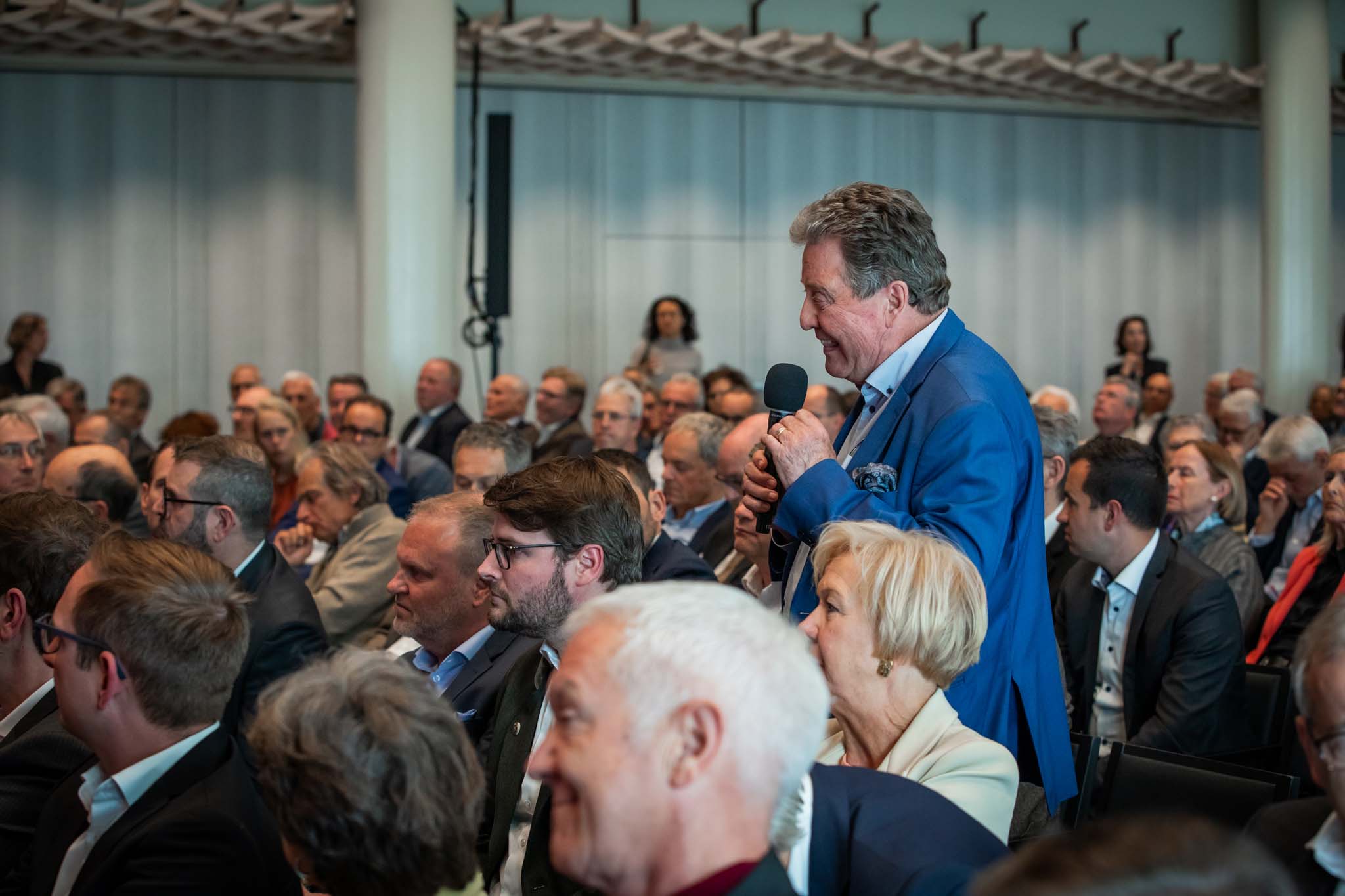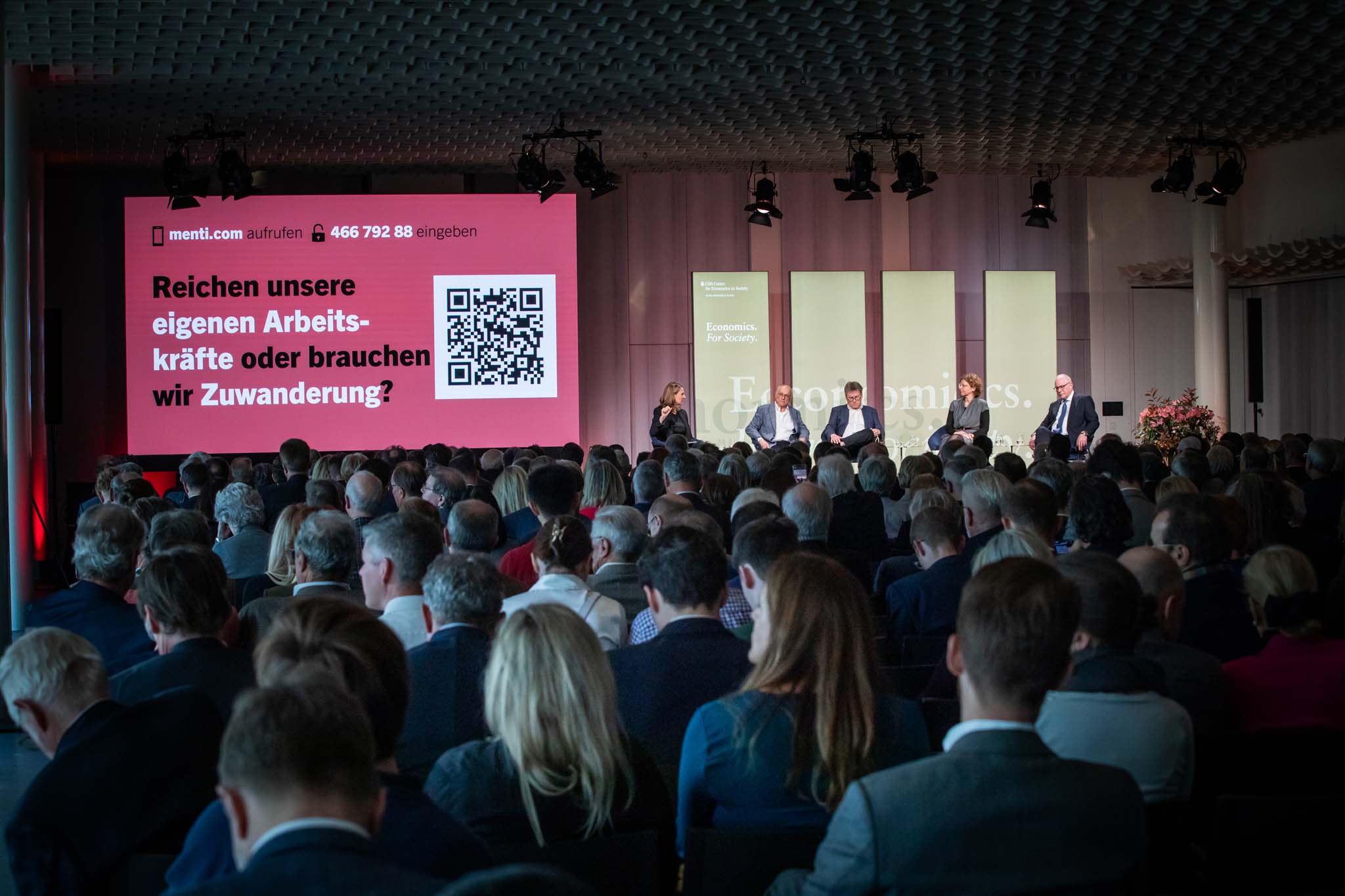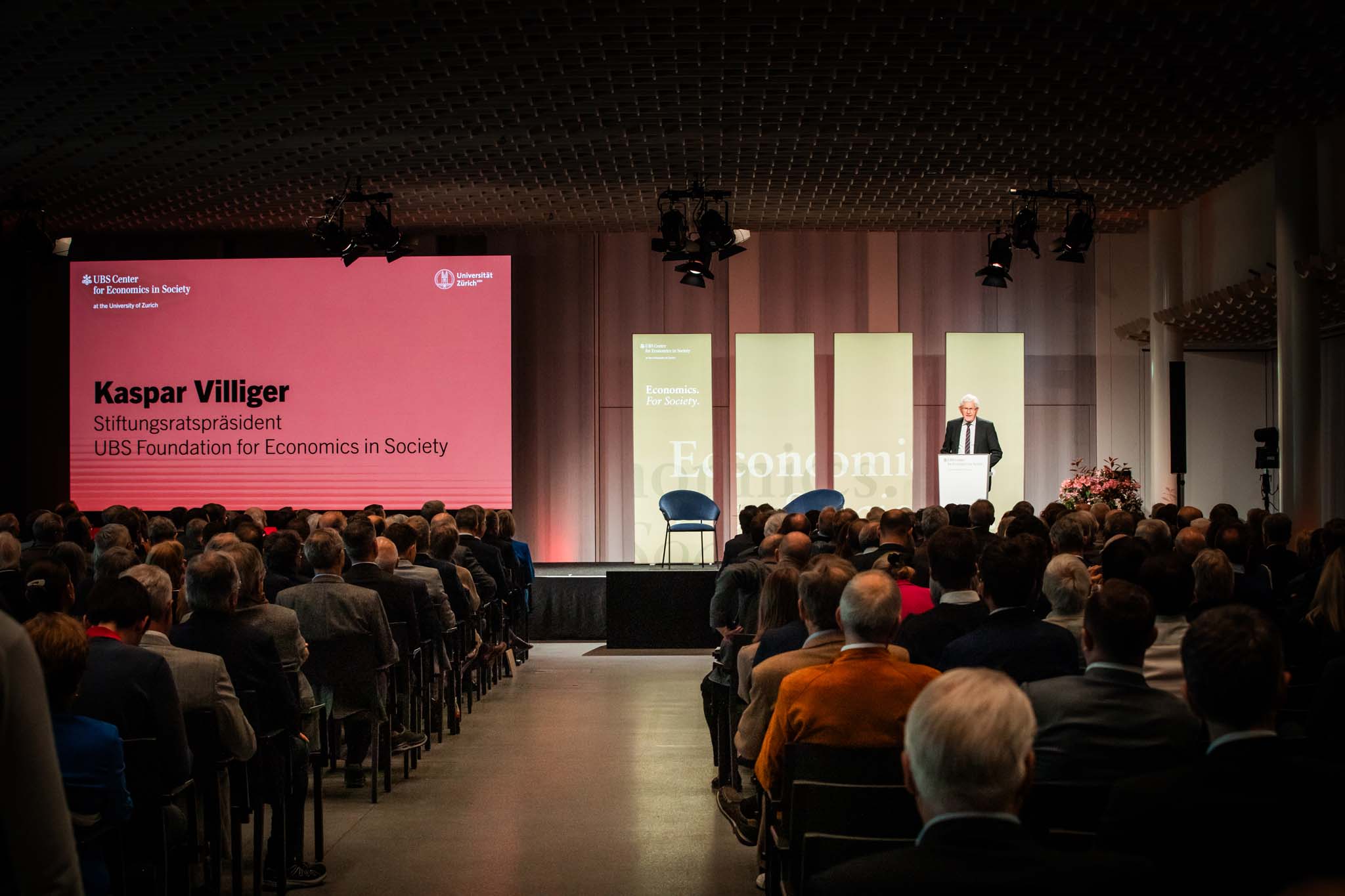Die Schweiz am Scheideweg: EU, Migration und Wettbewerbsfähigkeit
Livestream
Presse
Die Schweiz am Scheideweg
Welchen Weg schlägt die Schweiz in der Beziehung zur EU ein? Wächst die Schweiz nur in die Breite? Und was macht den Werk- und Denkplatz Schweiz stark? Dies waren die zentralen Fragen, die am vergangenen Wirtschaftspodium diskutiert wurden.
Auf dem ersten Panel wurde die Beziehung Schweiz-EU diskutiert. Was ist besser für die Schweiz: Alleingang oder institutionelle Anbindung an die EU? Es debattierten Ständerätin Esther Friedli (SVP), ETH-Ratspräsident Michael O. Hengartner und Ständeratspräsidentin Eva Herzog (SP).
Auf dem zweiten Panel wurden die ökonomischen Auswirkungen der Zuwanderung erörtert. Senkt die Zuwanderung unseren Wohlstand? Auf dem Podium nahmen teil: Prof. Reiner Eichenberger (Université de Fribourg), der Ökonom, Publizist und Autor Beat Kappeler, Prof. Alexandra Spitz-Oener (Humboldt-Universität Berlin) und der Leiter Direktion für Arbeit (SECO) Boris Zürcher.
Hauptreferent Bundesrat Ignazio Cassis wurde aufgrund einer Sondersession leider in Bundesbern aufgehalten und konnte seine Rede am Wirtschaftspodium nicht wie geplant halten. Das Publikum kam stattdessen in den Genuss eines pointierten Referats von alt Bundesrat Kaspar Villiger mit dem Titel "Selbstbehauptung eines weltoffenen souveränen Kleinstaats im Sturm einer zerfallenden Weltordnung", der dankenswerterweise kurzfristig einsprang.
Alle Vorträge und Diskussionen finden Sie wie gewohnt auf unserem YouTube-Kanal. Die Rede von Bundesrat Ignazio Cassis, die inzwischen veröffentlicht wurde, haben wir für Sie als UBS Center Insight bereitgestellt.
Welchen Weg schlägt die Schweiz in der Beziehung zur EU ein? Wächst die Schweiz nur in die Breite? Und was macht den Werk- und Denkplatz Schweiz stark? Dies waren die zentralen Fragen, die am vergangenen Wirtschaftspodium diskutiert wurden.
Auf dem ersten Panel wurde die Beziehung Schweiz-EU diskutiert. Was ist besser für die Schweiz: Alleingang oder institutionelle Anbindung an die EU? Es debattierten Ständerätin Esther Friedli (SVP), ETH-Ratspräsident Michael O. Hengartner und Ständeratspräsidentin Eva Herzog (SP).

Bildstrecke








Speakers
Ignazio Cassis worked as a medical doctor before starting his political career as a member of the communal parliament for Collina d'Oro, in the district of Lugano. Whilst serving as the cantonal physician, he was elected 2007 to the National Council as a member of FDP – The Liberals. 2017 Ignazio Cassis was elected to the Federal Council. In line with the seniority principle of the Federal Council he took on the presidency of the Swiss Confederation in 2022.
Reiner Eichenberger has been Professor of Theory of Economic and Financial Policy at the University of Fribourg since 1998 and Co-Founder and Research Director of CREMA (Center for Research in Economics, Management and the Arts). He specialises in the economic analysis of political processes and institutions. He has published three books, over 140 scholarly articles and countless contributions in popular media. He was a member of the Federal Communications Commission ComCom. Since 2016, he has been ranked second in the ranking of the NZZ and the FAZ on the social impact of economists in Switzerland.
Esther Friedli has been a member of the Council of States for the Canton of St. Gallen since 2023. She studied political science at the Universities of Bern and Aarhus (Denmark) with a minor in state law and complementary subjects in economics and media studies. Friedli is a freelance consultant for political communication and restaurateur.
Michael O. Hengartner served as Rector of the University of Zurich (UZH) from February 2014 to January 2020. From 2016 until his resignation as Rector of the UZH, he also served as President of swissuniversities. Michael Hengartner has dual Swiss and Canadian citizenship. He grew up in Quebec City where he studied biochemistry at the Université Laval. In 1994 he was awarded his doctorate at the Massachusetts Institute of Technology in the laboratory of Nobel Laureate H. Robert Horvitz. After that, he headed a research group at the Cold Spring Harbor Laboratory in the USA until 2001. In 2001, he was appointed to the newly established Ernst Hadorn Endowed Professorship at the Institute of Molecular Biology at the UZH. From 2009 to 2014, he was Dean of the Faculty of Mathematics and Natural Sciences of the UZH.
Eva Herzog has been a member of the Council of States of the Canton of Basel-Stadt since 2020. Before that, she was a government councillor and head of the Finance Department of Basel-Stadt, responsible for finance, taxation, real estate, human resources and information technology for more than 15 years. Herzog studied history, economics and Spanish at the Universities of Basel and Santiago de Compostela (Spain).
Beat Kappeler studied world economics and international law at the University of Geneva. He is a freelance business journalist. From 1977 to 1992, Beat Kappeler was Secretary of the Confederation of Trade Unions, in charge of liberalisation dossiers. Since 1992, he has been an economic commentator, first with the alte Weltwoche, and from 2002 to 2018 with the NZZ am Sonntag. He was awarded the Zurich Journalist Prize. From 1996 to 2000, he was former Professor of Social Policy at IDHEAP, University of Lausanne, and a member of the Federal Communications Commission. He travelled through some 30 state commissions.
Alexandra Spitz-Oener is a Professor of Economics at Humboldt-Universität zu Berlin, Germany, the Deputy Director of the ROOKWOOL Foundation Berlin Institute for the Economy and the Future of Work (RF Berlin), and a Research Associate at the Institute for Employment Research (IAB) in Nuremberg. In addition, she is a Principal Investigator of the Collaborative Research Center/TransRegio “Rationality and Competition,” funded by the German Sciences Foundation. Her research interests are in Applied Microeconomics, in particular Labor Economics. Her research focuses on understanding the challenges for workers brought about by technological changes, trade, and immigration.
Boris Zürcher has been Head of the Employment Directorate since 2013. Previously Chief Economist and Director of BAK Basel Economics AG, Basel. 2007 to 2012 Chief Economist and Vice-Director of Avenir Suisse, Think Tank for Economic and Social Issues, Zurich. 2002 to 2007 Economic Policy Adviser to Federal Councillors Pascal Couchepin, Joseph Deiss and Federal Councillor Doris Leuthard in the Federal Department of Economic Affairs. 1999 to 2002 Head of Employment Policy at SECO. After an apprenticeship as a mechanical draftsman, completed a secondary school diploma and studied economics and sociology at the University of Bern. Since 2003 lecturer at the University of Bern.
Kaspar Villiger is a Swiss businessman, politician and former member of the Swiss Federal Council (1989 – 2003), serving first as Minister of Defence and then as Minister of Finance. He was President of the Confederation twice, in 1995 and again in 2002. On April 15, 2009, he was elected Chairman of the Board of UBS, holding this post until May 3, 2012. Villiger is a member of the Global Leadership Foundation, an organization which works to promote good governance around the world. In 2012 he became Chairman of the new UBS Foundation of Economics in Society.
Katja Gentinetta is a Swiss political and economic philosopher. Since 2011, she has worked as an independent author, op-ed-writer, university lecturer, and strategic leader. She studied in Zurich and Paris and received her PhD for her work on the limits of tolerance in plural societies. She deepened her management knowledge and leadership skills in executive education in Salzburg, Harvard and at INSEAD and looks back on a long career as a leader in culture, politics and business. Katja Gentinetta has published a series of non-fiction books on social and economic policy issues. She has also been a TV moderator for many years, as host of “Sternstunde Philosophie” and co-host of NZZ Standpunkte at Swiss TV.
Ignazio Cassis worked as a medical doctor before starting his political career as a member of the communal parliament for Collina d'Oro, in the district of Lugano. Whilst serving as the cantonal physician, he was elected 2007 to the National Council as a member of FDP – The Liberals. 2017 Ignazio Cassis was elected to the Federal Council. In line with the seniority principle of the Federal Council he took on the presidency of the Swiss Confederation in 2022.
Reiner Eichenberger has been Professor of Theory of Economic and Financial Policy at the University of Fribourg since 1998 and Co-Founder and Research Director of CREMA (Center for Research in Economics, Management and the Arts). He specialises in the economic analysis of political processes and institutions. He has published three books, over 140 scholarly articles and countless contributions in popular media. He was a member of the Federal Communications Commission ComCom. Since 2016, he has been ranked second in the ranking of the NZZ and the FAZ on the social impact of economists in Switzerland.
Esther Friedli has been a member of the Council of States for the Canton of St. Gallen since 2023. She studied political science at the Universities of Bern and Aarhus (Denmark) with a minor in state law and complementary subjects in economics and media studies. Friedli is a freelance consultant for political communication and restaurateur.
Michael O. Hengartner served as Rector of the University of Zurich (UZH) from February 2014 to January 2020. From 2016 until his resignation as Rector of the UZH, he also served as President of swissuniversities. Michael Hengartner has dual Swiss and Canadian citizenship. He grew up in Quebec City where he studied biochemistry at the Université Laval. In 1994 he was awarded his doctorate at the Massachusetts Institute of Technology in the laboratory of Nobel Laureate H. Robert Horvitz. After that, he headed a research group at the Cold Spring Harbor Laboratory in the USA until 2001. In 2001, he was appointed to the newly established Ernst Hadorn Endowed Professorship at the Institute of Molecular Biology at the UZH. From 2009 to 2014, he was Dean of the Faculty of Mathematics and Natural Sciences of the UZH.
Programm
| 14.30 |
Türöffnung |
| 15.00 |
Begrüssung Katja Gentinetta (Politik- und Wirtschaftsphilosophin) |
| 15.05 |
Alleingang oder institutionelle Anbindung an die EU? Podiumsdiskussion: Esther Friedli (SVP), Michael 0. Hengartner (ETH Rat), Eva Herzog (SP) |
| 16.00 |
Kaffeepause |
| 16.30 |
Senkt Zuwanderung unseren Wohlstand? Podiumsdiskussion: Reiner Eichenberger (Université de Fribourg), Beat Kappeler (Ökonom und Autor), Alexandra Spitz-Oener (Humboldt-Universität), Boris Zürcher (SECO) |
| 17.30 |
Apéro |
| 18.00 |
Selbstbehauptung eines weltoffenen souveränen Kleinstaats im Sturm einer zerfallenden Weltordnung Referat: Alt Bundesrat Kaspar Villiger (UBS Foundation) |
| 19.00 |
Ende der Veranstaltung |
| 14.30 |
Türöffnung |
| 15.00 |
Begrüssung Katja Gentinetta (Politik- und Wirtschaftsphilosophin) |
| 15.05 |
Alleingang oder institutionelle Anbindung an die EU? Podiumsdiskussion: Esther Friedli (SVP), Michael 0. Hengartner (ETH Rat), Eva Herzog (SP) |
| 16.00 |
Kaffeepause |
| 16.30 |
Senkt Zuwanderung unseren Wohlstand? Podiumsdiskussion: Reiner Eichenberger (Université de Fribourg), Beat Kappeler (Ökonom und Autor), Alexandra Spitz-Oener (Humboldt-Universität), Boris Zürcher (SECO) |
| 17.30 |
Apéro |
| 18.00 |
Selbstbehauptung eines weltoffenen souveränen Kleinstaats im Sturm einer zerfallenden Weltordnung Referat: Alt Bundesrat Kaspar Villiger (UBS Foundation) |
| 19.00 |
Ende der Veranstaltung |
